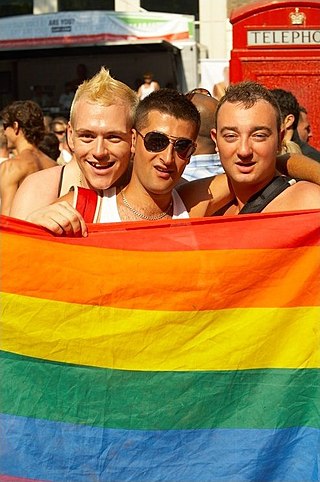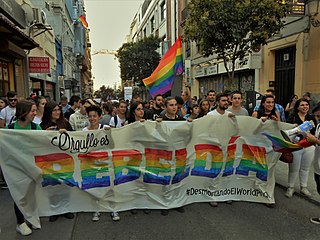
A pride parade is an event celebrating lesbian, gay, bisexual, transgender and queer (LGBTQ) social and self-acceptance, achievements, legal rights, and pride. The events sometimes also serve as demonstrations for legal rights such as same-sex marriage. Most occur annually throughout the Western world, while some take place every June to commemorate the 1969 Stonewall riots in New York City, which was a pivotal moment in modern LGBTQ social movements. The parades seek to create community and honor the history of the movement. In 1970, pride and protest marches were held in Chicago, New York City, Los Angeles, and San Francisco around the first anniversary of Stonewall. The events became annual and grew internationally. In 2019, New York and the world celebrated the largest international Pride celebration in history: Stonewall 50 - WorldPride NYC 2019, commemorating the 50th anniversary of the Stonewall Riots, with five million attending in Manhattan alone. Pride parades occur in urban locations worldwide, incl. cities or urban areas in Argentina, Australia, Brazil, Canada, Chile, Denmark, Finland, France, Israel, Japan, Mexico and the United States.

The Sydney Gay and Lesbian Mardi Gras or Sydney Mardi Gras is an event in Sydney, New South Wales attended by hundreds of thousands of people from around Australia and overseas. One of the largest LGBT festivals in the world, Mardi Gras is the largest Pride event in Oceania. It includes a variety of events such as the Sydney Mardi Gras Parade and Party, Bondi Beach Drag Races, Harbour Party, the academic discussion panel Queer Thinking, Mardi Gras Film Festival, as well as Fair Day, which attracts 70,000 people to Victoria Park, Sydney.

São Paulo LGBTQ Pride Parade is an annual gay pride parade that has taken place in Avenida Paulista, in the city of São Paulo, Brazil, since 1997. It is South America's largest Pride parade, and is listed by Guinness World Records as the biggest pride parade in the world starting in 2006 with 2.5 million people. They broke the Guinness record in 2009 with four million attendees. They have kept the title from 2006 to at least 2016. They had five million attendants in 2017. As of 2019 it has three to five million attendants each year. In 2019, it was also the second larger event of the city of São Paulo in terms of total revenue and the first in terms of daily revenue. In 2010, the city hall of São Paulo invested 1 million reais in the parade. According to the LGBT app Grindr, the gay parade of the city was elected the best in the world.

EuroPride is a pan-European international event dedicated to LGBT pride, hosted by a different European city each year. The host city is usually one with an established pride event or a significant LGBT community.

Taiwan Pride is the annual LGBTQ pride parade in Taiwan. The parade was first held in 2003. Although joined by groups from all over the country, the primary location has always been the capital city of Taipei. The parade held in October 2019 attracted more than 200,000 participants, making it the largest gay pride event in East Asia. As of 2019, it is the largest in Asia ahead of Tel Aviv Pride in Israel, which is the largest in the Middle East. Taiwan LGBT Pride Community, the organizer of Taiwan LGBTQ Pride Parade, holds the parade on the last Saturday of October.

The Chicago Pride Parade, also colloquially called the Chicago Gay Pride Parade or PRIDE Chicago, is an annual pride parade held on the last Sunday of June in Chicago, Illinois in the United States. It is considered a culmination of the larger Gay and Lesbian Pride Month in Chicago, as promulgated by the Chicago City Council and Mayor of Chicago. Chicago's Pride Parade is one of the largest by attendance in the world. The event takes place outside and celebrates equal rights for lesbian, gay, bisexual, transgender and queer people, which is also known as the celebration of LGBTQ rights.

The NYC Pride March is an annual event celebrating the LGBTQ community in New York City. The largest pride parade and the largest pride event in the world, the NYC Pride March attracts tens of thousands of participants and millions of sidewalk spectators each June, and carries spiritual and historical significance for the worldwide LGBTQIA+ community and its advocates. Entertainer Madonna stated in 2024, "Aside from my birthday, New York Pride is the most important day of the year." The route through Lower Manhattan traverses south on Fifth Avenue, through Greenwich Village, passing the Stonewall National Monument, site of the June 1969 riots that launched the modern movement for LGBTQ+ rights.

Pride is the promotion of the rights, self-affirmation, dignity, equality, and increased visibility of lesbian, gay, bisexual, transgender and queer (LGBTQ) people as a social group. Pride, as opposed to shame and social stigma, is the predominant outlook that bolsters most LGBTQ rights movements. Pride has lent its name to LGBTQ-themed organizations, institutes, foundations, book titles, periodicals, a cable TV channel, and the Pride Library.

Lesbians, Gays, Transsexuals and Bisexuals Collective Organization is a Spanish non-governmental association stated as a public utility and non-profit organization in Boletín Oficial del Estado which works actively for the rights of lesbians, gays, transsexuals and bisexuals. It is located in the surroundings of Chueca quarter in Madrid.

WorldPride is a series of international LGBT pride events coordinated by InterPride; they are hosted in conjunction with local LGBT pride festivals, with host cities selected via bids voted on during InterPride's annual general meetings. Its core events include opening and closing ceremonies, a pride parade, and an LGBT human rights conference.
The Guadalajara Pride is an event that celebrates diversity in general and seeks equal rights for LGBT people, is celebrated in the city of Guadalajara, Mexico.
This is a list of notable events in the history of LGBTQ that took place in Spain.

Tel Aviv Pride is a week-long series of events in Tel Aviv which takes place on the second week of June, as part of the international observance of Gay Pride Month. The key event, taking place on the Friday, is the Pride Parade itself which attracts over 250,000 attendees. As of June 2019, it is the largest LGBT Parade in Asia.

The Berlin Pride Celebration, also known as Christopher Street Day Berlin, or CSD Berlin, is a pride parade and festival held in the second half of July each year in Berlin, Germany to celebrate the lesbian, gay, bisexual, transgender and queer (LGBTQ+) people and their allies. Since 1979, the event has been held each year. Berlin Pride is one of the largest gay and lesbian organized events in Germany and one of the biggest in Europe. Its aim is to demonstrate for equal rights and equal treatment for LGBT people, as well as celebrate the pride in Gay and Lesbian Culture.

There have been pride parades in South Africa celebrating LGBT pride since 1990. South African pride parades were historically used for political advocacy protesting against legal discrimination against LGBT people, and for the celebration of equality before the law after the apartheid era. They are increasingly used for political advocacy against LGBT hate crimes, such as the so-called corrective rape of lesbians in townships, and to remember victims thereof.

Rainbow capitalism is the involvement of capitalism, corporate capitalism, and consumerism in appropriating and profiting from the LGBT movement. It developed in the 20th and 21st centuries as the LGBT community became more accepted in society and developed sufficient purchasing power, known as pink money. Early rainbow capitalism was limited to gay bars and gay bathhouses, though it expanded to most industries by the early-21st century.

Critical pride is the name of several annual protest demonstrations of LGBT people held in Madrid and several other Spanish cities. The organizers of critical pride demonstrations present them as an alternative to the original pride parades and festivals, which they consider depoliticized and institutionalized.

The LGBT community of Sydney, in New South Wales, is the largest in Australia and has a firm place as one of the iconic gay cities of the contemporary world. In a 2013 Pew Research poll, 79% of Australians agreed that homosexuality should be accepted by society, making it the fifth most supportive country in the survey behind Spain (88%), Germany (87%), Canada and the Czech Republic. With a long history of LGBT rights activism and the annual three-week-long Sydney Gay and Lesbian Mardi Gras festival, Sydney is one of the most gay-friendly cities in Australia and in the world.




















